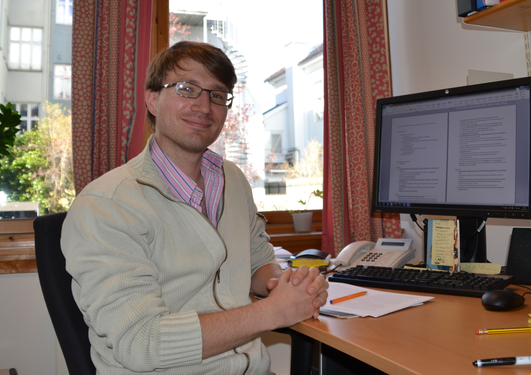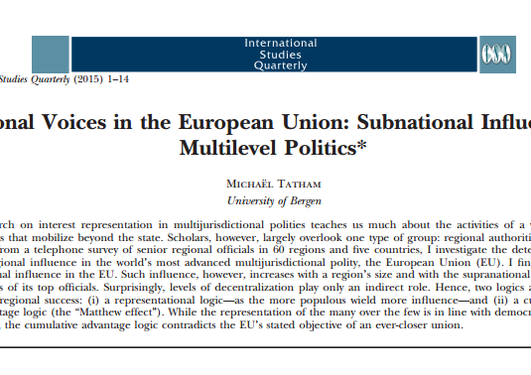SAMPOL scholar reveals new insights into European regions
In his new book, Professor Michaël Tatham explores how states and their sub-state regions cooperate (and sometimes clash) in the EU

Main content
A UiB scholar has published new findings on the political role of regions within the European Union.
In a new book, Michaël Tatham reveals that while sub-state regions are increasingly vocal within the EU, they often speak in unison with their member states.
New Book
Tatham is a Professor at the Department of Comparative Politics at UiB. His findings are reported in his new book, With, Without, or Against the State? How European Regions Play the Brussels Game.
For his book, Tatham set out to discover whether sub-state political actors in the EU mobilize in cooperation with the state of which they are a part, act independently of their parent state, or act in conflict.
Tatham says cooperation turned out to be most prevalent.
“Although I was very much looking for instances of conflict, what I found was much cooperation. In fact, cooperation is the dominant pattern here. Regions do mobilize directly in Brussels and they do bypass their own member state. But when they try to influence the policy process at the supranational level they tend to cooperate with their parent state. There are also instances of solo activities by regions. However, this is less frequent than cooperation. Conflicting lobbying also takes place, of course. When in Brussels, regions do sometimes go against their own state. But this is the exception rather than the rule.”
Tatham’s analysis also indicates that two factors play a role in explaining regional behavior in Brussels. First, partisan tensions between levels of government harm state-region relations at the EU-level. Second, and most importantly, greater decentralization is associated with greater cooperation. The effect is especially marked for regions with legislative powers (i.e. RegLeg regions). These findings show how domestic factors have an effect beyond national borders.
Tatham achieved his findings through both quantitative and qualitative research. He performed regression analyses on data collected through a survey addressed to heads of regional offices in Brussels. He also conducted more than 100 semi-structured interviews, developing in-depth case studies of the regions of Scotland, Salzburg, Alsace, and Rhône-Alpes.
Tatham’s book was released on August 25th by Oxford University Press. It is part of Oxford’s new book series Transformations in Governance, edited by recent Stein Rokkan Memorial Lecturers Liesbet Hooghe and Gary Marks (UNC Chapel Hill), as well as by Walter Mattli (Oxford University).
Academic Career
At UiB, Tatham works on federalism and regions in the EU, public policy analysis, and theories of European integration. He teaches introductory and specialized courses at BA and MA levels on these topics. He has published articles in Comparative Political Studies (CPS), the Journal of Public Administration Research and Theory (JPART), the International Studies Quarterly (ISQ), the Journal of European Public Policy (JEPP), European Union Politics (EUP), the Journal of Public Policy (JPP), the European Political Science Review (EPSR), and Regional and Federal Studies (RFS), among others.
He is also the co-chair of the Council for European Studies research network on Territorial Politics and Federalism (CES, Columbia University), co-editor of the journal Regional and Federal Studies (Taylor & Francis, Routledge), and co-editor of the book series on Comparative Territorial Politics (Palgrave Macmillan).
He graduated from the European University Institute, Florence (PhD) and the University of Oxford (MPhil), and was previously Assistant Professor at the Institute of Social Sciences, Humboldt-Universität zu Berlin, Germany.


